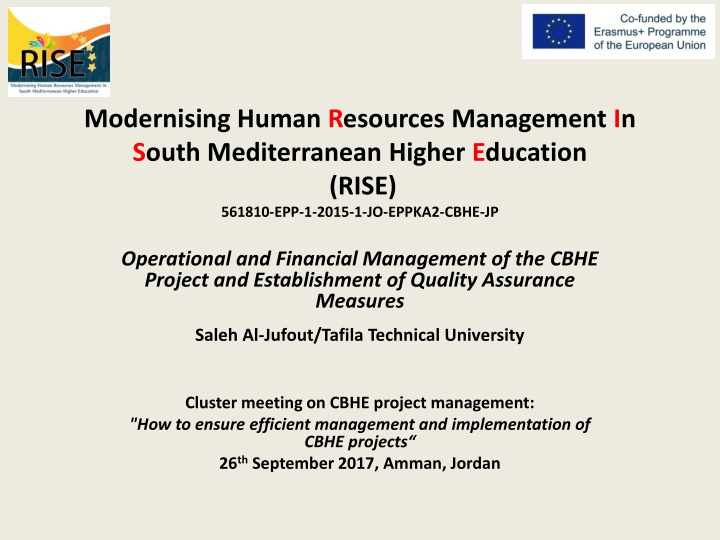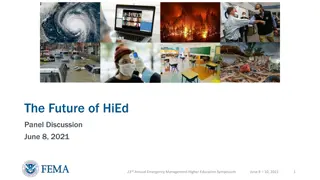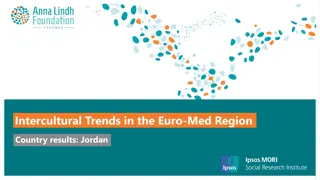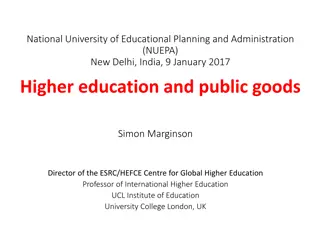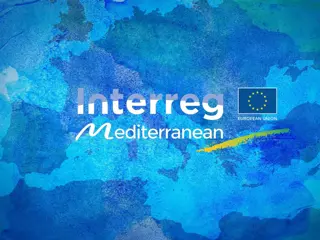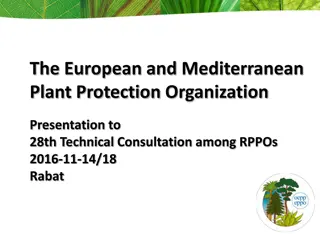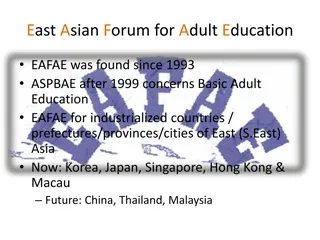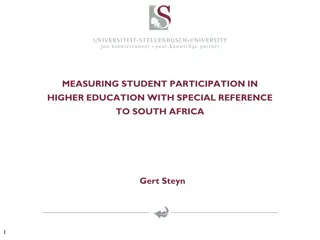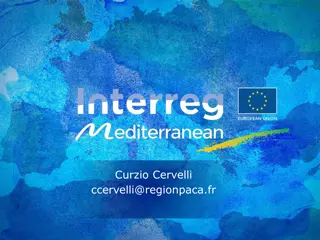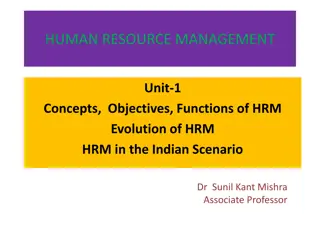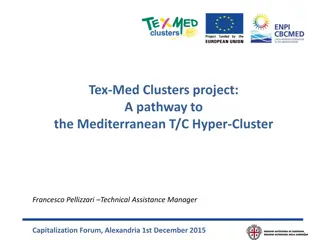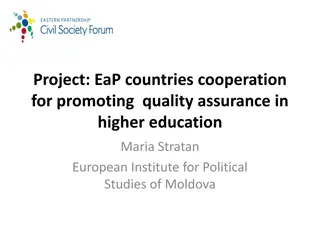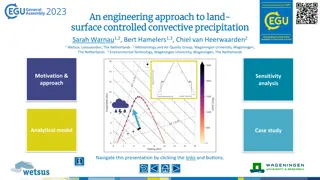Enhancing Human Resources Management in South Mediterranean Higher Education
This project focuses on modernizing HRM in higher education institutions within the South Mediterranean region. It includes operational and financial management, quality assurance measures, and building capacities in HRM for improved organizational efficiency.
Download Presentation

Please find below an Image/Link to download the presentation.
The content on the website is provided AS IS for your information and personal use only. It may not be sold, licensed, or shared on other websites without obtaining consent from the author.If you encounter any issues during the download, it is possible that the publisher has removed the file from their server.
You are allowed to download the files provided on this website for personal or commercial use, subject to the condition that they are used lawfully. All files are the property of their respective owners.
The content on the website is provided AS IS for your information and personal use only. It may not be sold, licensed, or shared on other websites without obtaining consent from the author.
E N D
Presentation Transcript
Modernising Human Resources Management In South Mediterranean Higher Education (RISE) 561810-EPP-1-2015-1-JO-EPPKA2-CBHE-JP Operational and Financial Management of the CBHE Project and Establishment of Quality Assurance Measures Saleh Al-Jufout/Tafila Technical University Cluster meeting on CBHE project management: "How to ensure efficient management and implementation of CBHE projects 26thSeptember 2017, Amman, Jordan
Partners and Objectives Co-ordinator/Grant Holder: 1. Princess Sumaya University for Technology European Partners: 2. Estonian Business School 3. Universite De Rouen 4. University of Magdeburg 5. Slovak University of Agriculture in Nitra 6. Agora Institute for Knowledge Management & Development Partners: 7. Ministry of Higher Education and Scientific Research 8. Mu tah University 9. Tafila Technical University 10. Universite De La Formation Continue 11. University Amar Telidji of Laghouat 12. University of Gabes 13. University of Monastir 14. Universit Cadi Ayyad 15. Universite Sultan Moulay Slimane Abeni-Mellal Jordan Estonia France Germany Slovakia Spain Jordan Jordan Jordan Algeria Algeria Tunisia Tunisia Morocco Morocco Objectives: To build up capacities and skills in HRM on target South Mediterranean HEIs for stronger organisational efficiency To create a regional network on HRM as a forum for exchange of good practices To conceive and develop institutional HR strategies in South Mediterranean HEIs 1/8
RISE Work-Packages WP1: In Depth Analysis WP2: Skills Enhancement, HRM Systems Upgrade and Networking WP3: Quality Control and Monitoring WP4: Awareness Raising and Sustainability WP5: Project Management WP3 is led by Slovak University in Nitra/Faculty of Economics and Management. The purpose and objective of this WP is to assure the quality of: the project deliverables: D1.1 Benchmarking study D2.1 Skills enhancement training program D2.3 HR systems modernisation D2.5 HRM guide D4.2 Dissem. package including the website D4.4 HR taskforce D5.1 Day-to-day coordination & manag. the processes and procedures used to develop these deliverables D1.2 D2.2 D2.4 D4.1 D4.3 D4.5 D5.2 Needs analysis report E-learning training modules University HRM network Dissemination strategy Project conferences Instit. HR strategic plans Reporting 2/8
Deliverables of WP3: Quality Control and Monitoring D3.1. Monitoring the project results: 3.1.1. Setting up Quality Board (QB), rules and procedures 3.1.2. QB meetings, internal quality control & monitoring D3.2. High quality of RISE project outputs: 3.2.1. Setting and implementation of feedback mechanisms To achieve this, a project quality plan is prepared. This PQP describes the necessary information required to effectively manage the project quality, from planning to delivery, comprising quality objectives in the project, and the quality management approach to ensure that the quality objectives are achieved. This PQP was discussed with stakeholders and experts to ensure the following: The PQP must be sufficient to achieve the required quality expected of the partners. In this regard the plan must not only be specific and detailed listing all quality requirements, but also include all the steps to be taken to ensure that those requirements are met. Quality assurance should be independent of the project itself (as well as the project manager). 3/8
Quality Control and Monitoring Quality control measures consists of both internal and external mechanisms: Internal Monitoring of the Project Results: A QB, composed of one member per partner, was set up at the beginning of the project. QB is responsible for monitoring, providing feedback and supervising the quality of the reports before passing them to the Coordinator. External Quality Control: - Monitoring meetings with National Erasmus+ Office in Jordan - External feedback via questionnaire and surveys - External feedback in events (meetings, workshops and conferences) Main indicators of progress and monitoring of achievements: - Comparison of progress reports against Logical Framework Matrix (LFM), work- plan and budget - Bi-annual QB meetings (six meetings, three of them are virtual) - Positive feedback questionnaires of workshops/events - Positive feedback on publications - QB reports/minutes 4/8
Quality Board QB stated two questions: What are the expected results from RISE project, that is, what RISE project shall achieve? How will the expected results be achieved, that is, is RISE project carried out in a correct way? QB aims at having the following answers: RISE project deliverables meet their requirements stated in the document of the detailed description of the project. RISE project management processes are appropriately followed. The quality management approach is about to insure that all members of the task-force of RISE project do the right thing right within the right time. This can be achieved by: Identification of all quality-impacting documents Reviews of all quality-impacting documents Using quality standards and procedures for each work-package of RISE project Using customer s satisfaction as a quality control tool in case quality standards and procedures are not used 5/8
Quality Control and Assurance The Quality Control in RISE project monitors the deliverables of the project to verify that they are achieved and of acceptable quality. This can be achieved by applying each project deliverable to the following matrix: Deliverable title Responsible Applied Quality Standards Approved by Status Description Planned delivery date Criteria of completeness Approval date Comments The Quality Assurance focuses on the processes used in RISE project. It is to ensure that the processes in the work-packages of the project are used effectively. This can be achieved by the following activities: Project Audit: Project audits are conducted to measure the application of the plan of the project and assess any deviations. Project Review: Project reviews are conducted to assess any deviations related to time, schedule, and budget which can affect the project expected outcomes. 6/8
Measuring Quality Measuring Quality consists of quantifying the current level of performance. This process requires: identifying quantitative and qualitative indicators of performance/impact collecting data and analyzing information Measuring quality leads directly to identifying areas for improvement or enhancement - the first step in quality improvement. Thus RISE project impact indicators were determined in both short and long terms. 7/8
For more information, please visit RISE project website at: http://www.rise-jo.eu/ Thank you for your attention
